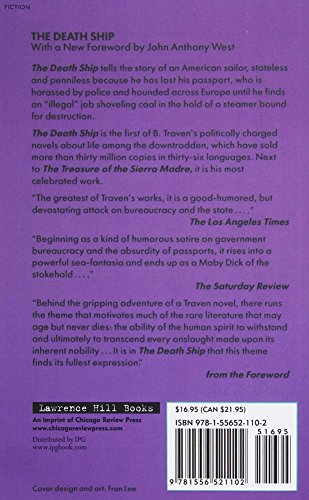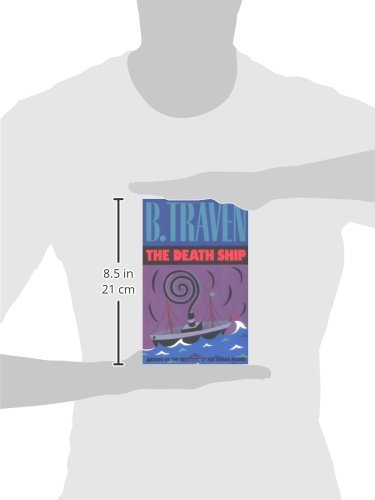Customer Services
Copyright © 2025 Desertcart Holdings Limited




Full description not available
G**O
The Good Sailor Schweik...
... as acted by Humphrey Bogart, in a hypothetical film based on the 1926 novel The Death Ship, written in buffo German by Ludwig von Mises and translated into bobo English by Raymond Chandler, or vice versa, in either case under the pseudonymn B. Traven!The narrator, who forgets his many names as quickly as he coins them, sails from New Orleans and finds himself stranded in Belgium without passport, seaman's card, or money. He is either a simpleton or a very satirical fellow, not unlike Jaroslav Hasek's `Good Soldier Svejk' or Mark Twain's `Connecticutt Yankee.' He's no "communist" in any case, though his loyalties and sympathies are all for the working class underdog. Not quite optimistic enough about human nature to be a solid anarchist, either! Certainly not a capitalist, since his dislike for authority of any kind extends to owners and bosses as well as police and bureaucrats! He portrays himself as an American, and a bit of a chauvinist at that, but his only real loyalty and admiration is reserved for himself as an autonomous piece of flotsam in a sea of greed and stupidity. Whether B. Traven was really German, American, or Martian, his character in The Death Ship is an American archetype, the loner, the frontier nihilist, the "ornery cuss" with a grudge against the world.Dumped by the bureaucrats - police, customs officers, judges, consuls - from Belgium to Netherlands to France to Spain, our sailor survives from comic mishap to mishap. Eventually, though life in Spain is almost tolerable, he makes the fatal error of taking a berth on a ship that he has already described as the most desolate, grimy, forlorn hulk on the seas. It's a `death ship' in his vision, a ship sent out to sink with all hands so that the owners can collect insurance. On the ship, the Yorikke, our sailor is known as Pippip.The resuscitation of Herman Melville was just beginning in the 1920s, but it would be hard to convince me that Traven did not intentionally construct The Death Ship as an inverse Pequod, or "Moby Dick Meets The Hairy Ape." The parallels in the two novels are blatant. The first third of each recounts the narrator's peculiar misanthropic activities on land. Once the narrator is aboard his ship, despite auguries of ill, he begins to expound the lore of the sea, but whereas the Pequod sails through the silent grandeur to the starlit mid-Pacific, the Yorikke chugs through scuddy squalls off Africa, its filthy coal-fired boilers belching a pall of industrial misery. While the Pequod harvests "light" in the form of whale-oil, the Yorikke sows darkness in smuggled guns. In both novels, the narrator forms an unlikely friendship, which will temper his misanthropy and which will lead to his physical salvation. Both fictional ships sink with all hands except the narrator, who is left floating on jetsam. And, to put it bluntly, both novels will seem endlessly dull to anyone who isn't receptive to their speculative philosophical digressions.The English version of the Death Ship appeared in 1934. No translator was identified; the supposition is that the author did it himself. I have both the English and the German texts, and surprisingly the English seems more fluent and stylish than the German. True, the English version has oddities, but they are all quite idiomatic. Whoever the author was, his range of allusions to American culture, history, and geography is vast, and almost too idiosyncratic to be the work of a `furriner.' The German has been rightly described as crude in syntax. So the mystery persists... who was B. Traven?
D**W
It never seems to be able to decide what it wants to be
There are quite a few things going in favor of this novel: it's funny, it doesn't romanticize the life of a high-seas sailor, it has a playfully Kafkaesque view of governments and bureaucracy, and it has touches of the bizarre-absurd that are entertaining.What the novel lacks, however, is a character - at least a human character; the Yorkiee is more fully realized than either our hero, Pipip (we don't even know his real name even when he says it's something else), or Stanislav. Both characters are so distant and lie about nearly everything and are either flippant about everything (Pipip) or morose about everything (Stanislav) that even though they are fun to follow around, they are unknown, vaporous entities.One thing that did occur to is that Pipip and Stanislav might actually the same person. And even if they aren't the prototype of The Narrator and Tyler in 'Fight Club', thematically they might as well be the same person because neither have a country, a past (that they're willing to tell the truth about), a future, or any prospects. Both are quite obviously members of that great early 20th century literary type known as 'The Lost Generation' that Hemingway so wonderfully romanticized and that explored the fractured new world order post WWI that modernism still deals with to this day. And unlike Kafka who was eternally pessimistic about a bleak world filled with faceless bureaucrats and stifling, soul-crushing laws, Traven at least tries to make the best of it with some humor.The best thing about the book is the ship itself - The Yorkiee. She is constantly reffered to as being as old as the Greek Triremes and Viking Long-ships and even having sailed the seas when Moses was safe in his arc. The Yorkiee has a wonderful, if unforgiving personality: her boilerroom is quite literally hell, her crew dirtier than any other crew alive on the earth, her skipper (and the company the skipper works for) so cheap that not even silverware or plates are provided for the crew.The Yorkiee also represents an interesting paradox concerning economics and governments (specifically capitalism): is it better to be stranded in the middle of the ocean, dying of thirst and delirium with no chance of survival or rescue and where blind, bleeding death is imminent any moment, or is it better to work for the worst, most inhumane, uncomfortable, filthy, unregulated, unsympathetic, lawless company in the world where you probaby won't even get paid and sure won't be provided for anything beyond enough water to keep you alive? These are the options Traven presents to the reader - well, that or Communism which is frowned upon by everyone who actually owns something in the story.The other interesting theme Traven explores is what does it mean to actually belong to the human race and how do you even prove you are human? With no passport, no birth certificate, no sailors card, no embassy willing to vouch for you, no records back home, and no government willing to help you, do you actually get to belong to the human race? Do these documents alosne make a person a Real Person? In a way, it's like trying to prove you are not crazy after you've been committed to an insane asylum such as the Rosenhan Experiments.Yet even with all these interesting things to think about, there really isn't much of a book here because it never seems to be able to decide what it wants to be: comedy? social satire? scathing economic critique? social justice? And these failings come from there being no character other than the machinery of a ship. Basically this novel fails in all the way where the great film The Wages of Fear succeeds. That film balanced the cheapness of human life with comedy with social satire and with dramatic tension in all the ways this novel could have had it been given a few more drafts. In fact, I almost feel as if this novel were written really, really quickly because Traven liked the voice of Pipip so much that he just ran wherever the story took him and didn't bother digging deeper.Still, there are enjoyable moments and the writing was easy-breezy, but it lacks depth; the sea in this novel is very wide but also very shallow. Go watch 'The Wages of Fear' instead.
R**Z
Style Too Thin and Fantastic
The mysterious B. Traven, may have been the son of the Kaiser Wilhelm, and he is quite a writer of interesting repute. Being a fan of the movie "The Treasure of the Sierra Madre" and the off-beat style of the movie, I thought that this novel would give me a realistic grit-eyed view of the labouring class in the 20s and 30s. What I got was a modern day Candide!Now I love Voltaire as well, but the style is just not my cup of tea for a modern novel perporting to show you the real side of the industrial working class: although the death ship is a real rust bucket and a voyage of the damned, it is written in terms at time fantastic and at times deadpan comical Kafka-esque. The style does not work for me... maybe that is just me. If you are looking for grit and realism then this book clearly does not offer it. Like Candide the hero is washed from country to country and scenario to scenario with almost hilarious regularity. Although there is no sop to Dr. Pangloss, our hero seems to be both equal parts tragic victim and survivor... no matter what...I was really kind of put off by Traven and you know about the old story of once bitten....
T**N
Great book, thoughtful seller
Seller took time to confirm my understanding of book condition, being an older book. In great condition, so very thoughtful.Great book too. Really enjoy it.
R**L
My favorite author, He writes so well.
This story is entertaining, thought provoking, and so well written. A timeless tale of the sea, and of society. A very enjoyable read. I highly recommend getting this book, you will not regret it at all. Enjoy!
A**O
Good read.
I had read this book about 30 years ago,it had an special effect on me ,reading it again after such a long time make me realize that the world has not change a bit,still who you are and what freedom and service you get in your life depends on which class in society you belong .Good read .
A**R
Four Stars
fine
E**N
A book to read before you die!
I've read so many different types of fiction in my life, sadly not all of it good, but this is a book which is unlike anything I have ever read. At first glance it appears quite an "ordinary" tale, but it has hidden layers, and murky depths, which will haunt you for a long time after you've read the final page.Buy it.You won't regret it!
D**F
One of the best novels ever!
A great story by the intriguing B Traven. The Death Ship really should be recognised as a 'classic' and more widely read.
S**Y
Two Stars
Our Book Club book - not for me.
Trustpilot
1 day ago
2 days ago